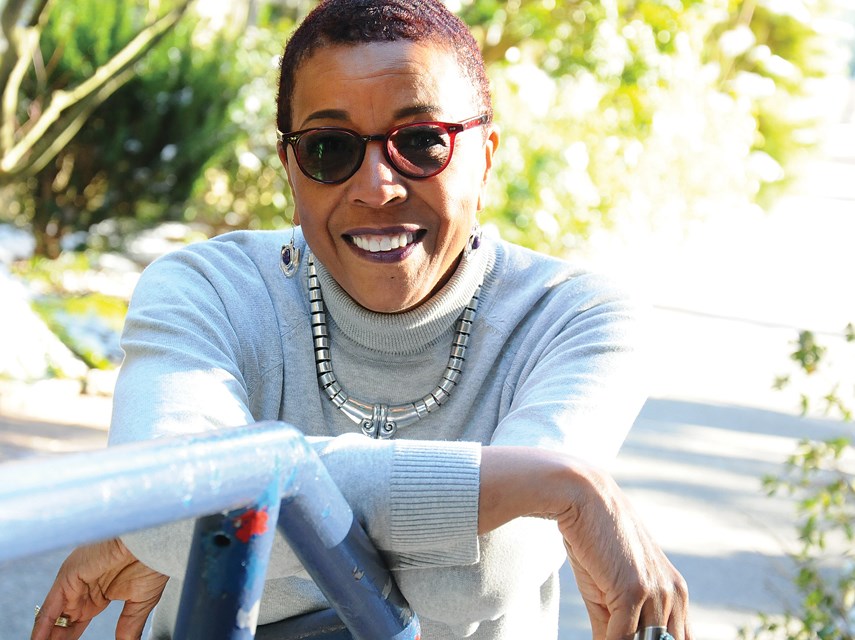Dee Daniels with NiteCap, Cap Jazz, Kay Meek Centre, Friday, Feb. 23 at 7:30 p.m. Tickets $35 / $32. For more information visit capilanou.ca.
You’ve got to get out of this city.
It was Seattle in the spring of 1982. Dee Daniels was singing one of those tunes you could call jazz or blues or gospel; although you’d probably do better not to call it anything and just enjoy it.
Listening was LeRoy Neiman, the artist with the surrealist mustache and the paintings of powerful figures whose edges bleed into swirling novas of colour.
Neiman was being honoured for his painting of Seattle Mariners pitcher Gaylord Perry, but the spitball hurling hall of famer was likely yanked from his mind as Daniels sang.
Keeping her in the Pacific Northwest was like sequestering a cathedral bell in a crawlspace.
“Immediately upon finishing, he came and grabbed me by the arm and took me over in the corner, sat me down, he said: ‘What the hell are you doing here in Seattle?’” Daniels recalls. “I knew exactly what he was talking about.”
For Daniels, Seattle was familiar clubs, her own house and a “comfortable rut.”
“He said: ‘You’ve got to get out,’” she recalls.
Like Snake Plissken she escaped the city. The smog dissuaded her from southern California and New York meant starting over. But Europe “was still the golden years,” she says. There were the Hank Jones and Tommy Flanagan trios and “all these big band horn players up the ying yang.”
Major jazz artists went to Europe at least every six months and when they needed a singer she got the call.
“All I did was work,” she says. “I had an opportunity to sing with – to sing with, not just be on a stage with – Sarah Vaughan, who was my hero.”
Spending five years in Europe gave Daniels a chance to “see where you really are” as an artist.
“I didn’t know anybody,” she says. “It’s an incredible, sometimes scary opportunity to create your life. I mean hands on.”
As she prepares to sing “I Could Have Danced All Night” and “Get Here” alongside Capilano University’s NiteCap jazz band, Daniels recollects her childhood in Oakland and waking up to the blues.
As her father was getting ready for work he’d put on records by Lightnin’ Hopkins, Howlin’ Wolf, and Bobby “Blue” Bland.
“There was music all around, all the time,” she says, recalling the spinets and old, upright pianos that seemed to be fixtures in every home.
“Every kid, it seemed like, learned to play the boogie woogie on the black notes,” she says with a chuckle.
She picked things up “bit by bit,” taking six months of piano lessons at five.
“If you’re interested, you can teach yourself a whole lot,” she says.
She figured out how to play hymns (“Just two notes in the left hand and two notes in the right notes.”) and eventually added the acoustic bass, the cello and the violin to her repertoire.
Those formative musical years culminated with Daniels earning a spot in the Oakland Symphony Youth Orchestra, allowing her to hear “colours and textures” that animate her music to this day.
“It was definitely uploaded into my brain,” she says. “They’re there forever and if you give permission, they come out when you least expect it.”
But despite the role music played in her life, it was never supposed to be her livelihood.
“I just . . . never ever thought of music as a career.”
She didn’t waver until she was walking out of a New Year’s Eve party. At the door was a band she’d sang with in her college days in Montana. They were looking for a singer.
Gainfully employed as a teacher, she turned them down.
“I had a real job!” she laughs. “I was getting paid.”
She started singing anyway, first on the weekends, then week nights, and then six nights a week.
“The candle was burning at both ends and now it’s starting to burn in the middle,” she says.
She handed her day job to a teaching assistant “and never looked back.”
Whether she’s belting out the “Battle Hymn of the Republic” or purring through “Exactly Like You,” Daniels is always guided by the song’s story.
“I consider myself a storyteller who tells stories as opposed to a singer who sings songs.”
Every song needs to be something she’s seen or lived or felt, Daniels explains.
“Then I can make it mine.”



